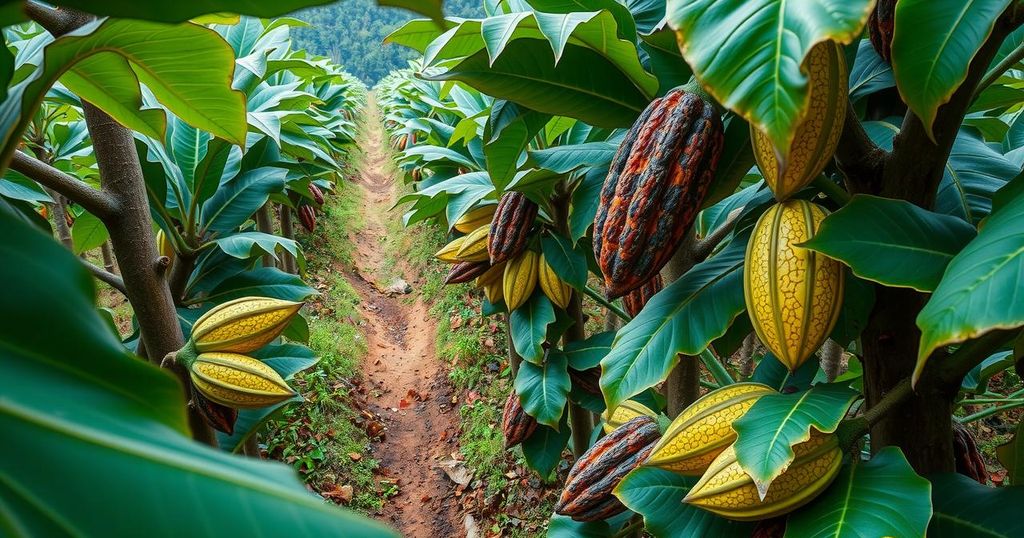Cocoa Farmers in Indonesia Collaborate with Businesses to Combat Climate Change
Cocoa farmers in Indonesia are collaborating with businesses and NGOs to confront climate change impacts and improve cocoa production. Despite extreme weather challenges pushing cocoa prices to record levels, sustainable practices and cooperative financial structures are being implemented. Efforts led by companies like Krakakoa are enhancing farmer livelihoods through training and financial support, ensuring a more resilient chocolate industry.
On March 17 in Tanjung Rejo, Indonesia, cocoa farmer Tari Santoso engaged in sustainable farming practices to improve crop health amid climate change challenges. Thousands of cocoa farmers are collaborating with businesses and organizations to combat the adverse effects of climate change and underinvestment, which have inflated cocoa prices to unprecedented levels.
Cocoa trees require a specific climate, thriving solely near the equator, and take five years to produce beans for chocolate and other products. Climate change is exacerbating the risks faced by farmers: higher temperatures diminish yields, while longer rainy seasons facilitate the spread of diseases and pests. Unpredictable weather patterns complicate their adaptation efforts, prompting many to switch to alternative crops, which further constricts cocoa supply, driving prices up to approximately $12,000 per ton in 2024.
Indonesia ranks as the third-largest cocoa producer globally, following Cote D’Ivoire and Ghana. In light of current challenges, farmers are teaming with businesses and NGOs to enhance agricultural practices and uplift their economic wellbeing. In South Sumatra, farmer Santoso has partnered with the Indonesian chocolate company Krakakoa since 2016, implementing improvements such as pruning, grafting, and the use of organic fertilizers.
These agricultural adjustments integrate sustainability into his farming, allowing for the cultivation of diverse crops alongside cocoa, which, in turn, enriches the ecosystem. Santoso acknowledged, “It wasn’t very successful before we met Krakakoa. But then, we received training … things are much better.”
Krakakoa has trained over 1,000 cocoa farmers in Indonesia, providing not only educational resources but also financial assistance. The cooperative formed by farmers in Sumatra, supported by the partnership, offers low-interest loans, ensuring that repayments benefit the community rather than external banks. Armin Hari, a communications manager at the Cocoa Sustainability Partnership, noted that collaborations with businesses can facilitate access to larger loans from government banks through guaranteed buyer agreements serving as collateral.
In summary, Indonesian cocoa farmers, under the guidance of collaborations with businesses like Krakakoa, are proactively adapting to climate change while enhancing their livelihoods. This partnership model supports sustainable farming practices and provides crucial financial resources, increasing community resilience against economic volatility in the cocoa market. Through continued education and cooperative efforts, farmers can better navigate the challenges presented by climate change and demand fluctuations.
Original Source: risingnepaldaily.com




Post Comment